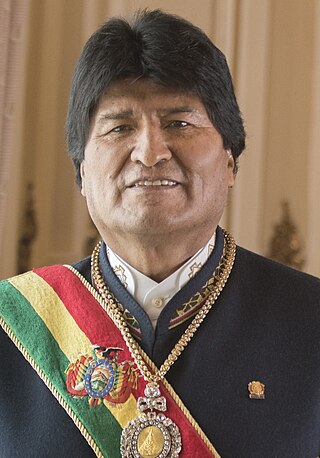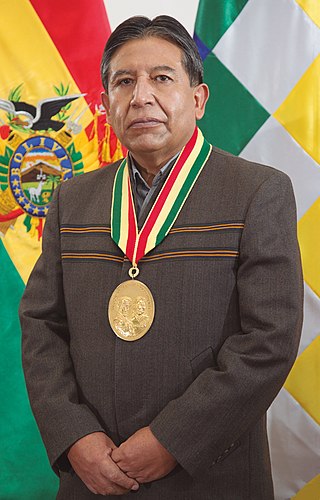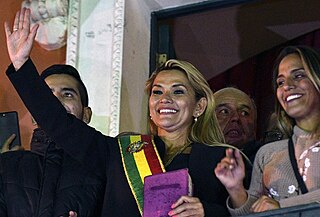
Gonzalo Daniel Sánchez de Lozada Sánchez Bustamante, often referred to as Goni, is a Bolivian-American businessman and politician who served as the 61st president of Bolivia from 1993 to 1997 and from 2002 to 2003. A member of the Revolutionary Nationalist Movement (MNR), he previously served as minister of planning and coordination under Víctor Paz Estenssoro and succeeded him as the MNR's national chief in 1990.

Juan Evo Morales Ayma is a Bolivian politician, trade union organizer, and former cocalero activist who served as the 65th president of Bolivia from 2006 to 2019. Widely regarded as the country's first president to come from its indigenous population, his administration worked towards the implementation of left-wing policies, focusing on the legal protections and socioeconomic conditions of Bolivia's previously marginalized indigenous population and combating the political influence of the United States and resource-extracting multinational corporations. Ideologically a socialist, he led the Movement for Socialism (MAS) party from 1998 to 2024.

David Choquehuanca Céspedes is a Bolivian diplomat, peasant leader, politician, and trade unionist serving as the 39th vice president of Bolivia since 2020. A member of the Movement for Socialism, he previously served as minister of foreign affairs from 2006 to 2017 and as secretary general of ALBA from 2017 to 2019.

A constitutional referendum was held in Bolivia on 25 January 2009, postponed from the initially planned dates of 4 May 2008 and then 7 December 2008. Drafted by the Constituent Assembly in 2007, the new constitution was approved in the referendum according to an exit poll by Ipsos Apoyo for La Razón and ATB, a Bolivian television network. Furthermore, it required early elections to be held on 6 December 2009.

Bolivia–United States relations were established in 1837 with the first ambassadorial visit from the United States to Peru–Bolivian Confederation. The Confederation dissolved in 1839, and bilateral relations did not occur until 1848 when the United States recognized Bolivia as a sovereign state and appointed John Appleton as the Chargé d'Affaires.

Considering the main health indicators, Bolivia has made improvements over the last decades. Since 1950, life expectancy at birth has considerably improved from 40.7 years to 68.6 years in 2023, falling a little behind the world trend. Child mortality rate has greatly decreased since 1950, from 39.2% to 2.95% in 2019, being slighly lower than the world's rate (3.71%). Maternal health although has improved considerably, maternal mortality ratio continues to be higher than the world's ratio in 2021.
Poverty in South America is prevalent in most of its countries. Those that have the highest rates of poverty per population are Suriname, Bolivia and Venezuela. Recent political shifts in the region have led to improvements in some of these countries. In general, most South American economies have attempted to tackle poverty with stronger economic regulations, foreign direct investments and implementation of microeconomic policies to reduce poverty.

Televisión Boliviana is the first television channel of Bolivia and serves the only means of television communication from the government. The channel was established in August 1969 under the government of Luis Adolfo Siles after years of planning by the government of then-recently deceased René Barrientos. It is a state-owned broadcasting network.

The foreign policy of the Evo Morales administration concerns the policy initiatives made towards other states by the former President of Bolivia, in difference to past, or future, Bolivian foreign policy. Morales' foreign policy can be roughly divided between that of the Americas and the rest of the world.

The domestic policy of the Evo Morales administration refers to the domestic policy initiatives of the former President of Bolivia, including past pre-presidential advocacies by Morales.

The history of Bolivia since 1982 begins with the restorations of democracy after the rule of the military junta of 1982. Evo Morales held the presidency from 2006 to 2019. A new constitution was enacted in 2009. Bolivia's population has roughly doubled over this period, from 5 million in 1980 to 10 million as of 2012.

The Ministry of Cultures, Decolonization, and Depatriarchalization is the ministry of the government of Bolivia that provides for the preservation and protection of the cultures and artistic expressions of the indigenous peoples of Bolivia as well as promotes the country's tourism sector and process of decolonization and depatriarchalization.

Luis Alberto Arce Catacora, often referred to as Lucho, is a Bolivian banker, economist, and politician serving as the 67th president of Bolivia since 2020. A member of the Movement for Socialism, he previously served as minister of finance—later minister of economy and public finance—from 2006 to 2017, and in 2019.

Esther Morales Ayma de Willacarani was a Bolivian grocer, businesswoman and political activist. In 2006, she was designated to the role of First Lady of Bolivia by her younger brother, then-President of Bolivia Evo Morales, who was unmarried.

The 2019 Bolivian political crisis was a period of intense political upheaval and unrest in Bolivia that followed the disputed 2019 Bolivian general election, in which incumbent President Evo Morales was initially declared the winner. Morales had run for a controversial fourth term despite having recently lost a constitutional referendum to remove presidential term limits. His bid for reelection was enabled after the Supreme Court then struck down the term limits. The election and the results were heavily contested, with protests occurring across the country as the opposition and many sectors of society alleged that the vote count was manipulated to favor Morales.
The Chapare Drug Cartel is a Bolivian criminal organization dedicated to drug trafficking and human trafficking that operates in the Chapare region. For this, several journalists have baptized this organization simply as the Chapare Cartel

Andrónico Rodríguez Ledezma is a Bolivian cocalero activist, political scientist, politician, and trade unionist serving as president of the Senate since 2020. A member of the Movement for Socialism, he serves as senator for Cochabamba. Rodríguez's lengthy career in the cocalero union hierarchy saw him serve as general secretary of the 21 September Workers' Center from 2015 to 2016 and as executive of the Mamoré Bulo Bulo Federation from 2016 to 2018, in addition to a multitude of other minor positions. He has served as vice president of the Coordination Committee of the Six Federations of the Tropic of Cochabamba since 2018 and held office as president of the organization from 2019 to 2020 in the absence of the body's longtime leader, Evo Morales.

Bolivia-Venezuela Relations are the existing bilateral relations between the Plurinational State of Bolivia and the Bolivarian Republic of Venezuela. Both nations established their diplomatic relations on 14 September 1883, during the government of the President of Bolivia Narciso Campero Leyes and the government of the President of Venezuela Antonio Guzmán Blanco.
María Magdalena Cajías de la Vega is a Bolivian academic, historian, and politician who served as minister of education from 2007 to 2008. Cajías spent most of her professional career teaching history at the Higher University of San Andrés, in addition to holding a number of consultancy posts for intergovernmental organizations and government bodies. She authored multiple published historical titles, focusing on the fields of women's and labor history. In 2006, Cajías was brought on as a consultant for the Ministry of the Presidency before being appointed to head the Ministry of Education the following year. After a brief return to academia following the conclusion of her ministerial term, Cajías returned to public administration as consul general in Santiago, where she served from 2014 to 2019. In 2021, she was named as a member of the editorial board of the Bolivian Bicentennial Library.

Juan José Zúñiga Macías is a former Bolivian Army officer who served as the General of the Bolivian Army from November 2022 until his dismissal in June 2024 following his role in the coup d'état attempt against the President Luis Arce.















